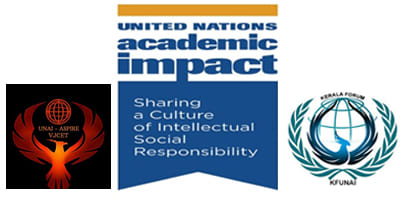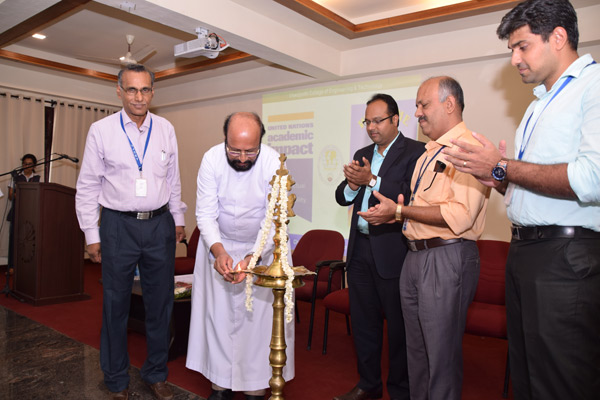
United Nations Academic Impact (UNAI)
The United Nations Academic Impact (UNAI) is a United Nations initiative which was formed on 18th November 2010. UNAI is an initiative that engages institutions of higher education with the United Nations in supporting and contributing to the realization of the Organization's purposes and principles, including the promotion and protection of human rights, access to education, sustainability and conflict resolution. Since 2010, UNAI has created a vibrant and diverse network of students, academics, scientists, researchers, think tanks, institutions of higher education, continuing education and educational associations. There are over 1,600 member institutions in more than 150 countries that reach over 25 million people in the education and research sectors around the world representing a global diversity of regions and a thematic wealth of disciplines.
Foundation
Viswajyothi College of Engineering and Technology has become a member of United Nations Academic Impact in June 2017. ASPIRE chapter of VJCET started functioning from November 2017. The activities of UNAI were coordinated by the governing body consisting of faculty members and students from all the departments. Governing body is led by Dr. K K Rajan, Principal VJCET.

UNAI Vision
Brilliance in social activities and research that promotes prosperity and economic opportunity, greater social well-being, and protection of the environment.
UNAI Mission
The participating institutions are expected to support one of the 10 UNAI principles.
The Ten Principles
17 SDG Goals
In 2015, the United Nations set a number of ambitious goals to be achieved in the next 15 years to make our world a better place for everyone: end poverty, protect the planet, and ensure prosperity for all. The UN Sustainable Development Goals, a collection of 17 global goals set by the UN’s member countries, are a roadmap on how to transform our planet where everyone can live in peace, prosperity, and dignity.
The 17 sustainable development goals (SDGs) to transform our world:
Action by Students to Promote Innovation and Reform through Education (ASPIRE)
ASPIRE, which stands for Action by Students to Promote Innovation and Reform through Education, is a student driven initiative uniting to promote United Nation’s Academic Impact’s vision of institutions of higher education and research. ASPIRE embodies UNAI’s ten basic principles within student communities around the globe and brings out the innovative ideas. Operating locally within their communities, the activities of each ASPIRE group contributes to UNAI’s overall message of unity and action to address global challenges. Since 2010, UNAI has created a vibrant and diverse network of students, academics, scientists, researchers, think tanks, institutions of higher education, continuing education and educational associations. Since its inception some thirty international networks of universities and other institutes of higher education and research have endorsed UNAI and encouraged their members to join, representing a global diversity of regions and a thematic wealth of disciplines. ASPIRE personifies the saying, “Sharing a Culture of Intellectual Social Responsibility.” It connects student organizations and individuals to global opportunities through the United Nations, educational and academic institutions, and civil society groups that focus on the UNAI principles. ASPIRE groups are directly affiliated to UNAI, and when their institution is a UNAI member, to it as well. ASPIRE priorities above all else, activism and action by students to promote and support the ten universally accepted UNAI principles.
ASPIRE groups are encouraged to:
Governing Body
| NAME | DEPARTMENT | UNAI DESIGNATION |
|---|---|---|
| UNAI-ASPIRE Officials | ||
| Dr. K. K. Rajan | Principal/Head of Institution | |
| Ms. Smitha Cyriac | ECE | UNAI Focal Point 1 |
| Ms. Cini K | EEE | UNAI Focal Point 2 |
| UNAI-ASPIRE Executive Committee | ||
| Thomas John P | S6 AD | Student Coordinator |
| Ann Maria Teny | S6 AD | Joint Student Coordinator |
| Deon Johny | S5 CSE A | KFUNAI Student Council Member |
| Dhiya Merin Babu | S5 CSE C | Head Documentation Committee |
| George Raju | S6 CSE B | Head Programme Committee |
| Joyal Sojan | S6 IT | Media and Design Committee |
UNAI Annual Report:
| Year | |
|---|---|
| 2024-2025 | VIEW |
| 2023-2024 | VIEW |
| 2022-2023 | VIEW |
| 2021-2022 | VIEW |